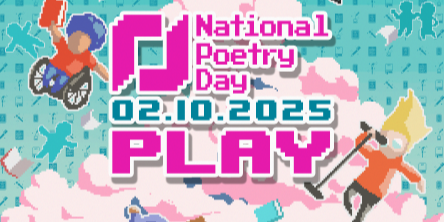When is National Poetry Day 2025?
This year, National Poetry Day takes place on Thursday 2 October 2025, and the theme is 'play'.
What is National Poetry Day?
Aiming to inspire a love of poetry, this annual event provides a fantastic opportunity to explore and celebrate poetry. From engaging with familiar poems we love, to the creative fulfilment of crafting new works, we're providing inspiration and accessible activities for all ages to use in your school or setting.

Children and young people's engagement with poetry research
Our recent research in to Children, young people and poetry in 2024 found that:
- Almost 1 in 2 (48.8%) 8 to 16-year-olds are currently engaging with poetry in some form – whether reading, writing, listening to or performing it – meaning that over half are missing out on the benefits.
- Children and young people who read, watch or listen to poetry identified significant benefits for their wellbeing, confidence, aptitude for learning and empathy.
- Interestingly, more children and young people who receive free school meals say they engage with poetry in their free time than their peers who do not receive free school meals, both in terms of consuming (32.6% vs 20.9%) and creating (18.3% vs 11.3%) poetry.
- There is a significant decline in interest among older children, with only 1 in 6 (17.3%) young people aged 14 to 16 engaging in their free time compared with 1 in 2 (48.7%) of those aged 8 to 11.
Explore all of our research into poetry.
National Poetry Day Resources
Read on to find out more about the support provided in 2024. Updated information for 2025 will be added here as it becomes available.
In 2024, to celebrate National Poetry Day and our brilliant West Yorkshire Young Poet Laureates, we developed classroom resources tailored for pupils aged 3 to 14 (early years, KS1, KS2 and KS3/Early, first, second, and third/fourth levels).
The first-ever West Yorkshire Young Poet Laureate winners, Alina and Isabelle, crafted exclusive pieces for the year’s theme of counting. Alongside exploring the works of our Young Poets Laureate, pupils were given the opportunity to explore poems from other writing role models, enriching their poetry knowledge. The session concludes with pupils crafting their own poems inspired by the theme Your Voice Counts and what matters to them.
An optional poetry showcase is also recommended, offering a platform for pupils to share their voices, words, and stories through poetry.
Our suite of resources for 2024 comprises the following:
- age 3 to 5 years (early years/early level and P1): inspiration for using counting poems to explore poetry and language, including a selection of book recommendations
- age 5 to 7 years (KS1/P2-3): a 50-minute learning sequence where pupils will read and explore poems inspired by the theme 'Your Voice Counts', and produce their own counting-inspired poem
- age 7 to 11 years (KS2/P4-7): a 50-minute learning sequence where pupils will read and explore Alina's poem 'Your Voice Counts' and produce their own poem inspired by the theme
- age 11 to 14 years (KS3/S1-S3): a 50-minute learning sequence where pupils will read and explore Isabelle's poem 'Finding Your Voice' and produce their own poem inspired by the theme
Download resources at the bottom of the page. You may need to log in to your account, or sign up for a free membership to download.
More classroom poetry resources
Build on the inspiration of National Poetry Day to continue your class journey exploring students' responses to poems and to help them create and perform their own work.
Explore these additional resources and activities which are curriculum-linked and support the the development of skills and confidence in writing, storytelling, working together and performance.
- Digital Poet in residence (ages 7 to 11)
- Writing from Nature: a poetry resource (ages 7 to 13)
- Monologue Jam (age 14+)
- A poetry lover's classroom (primary)
- Writing poems with Paul Cookson: (primary)
- Poetry in the early years foundation stage (early years)
Get involved with National Poetry Day
You can find more National Poetry Day resources, learn about events and celebrations taking place, and get involved by visiting the National Poetry Day website.